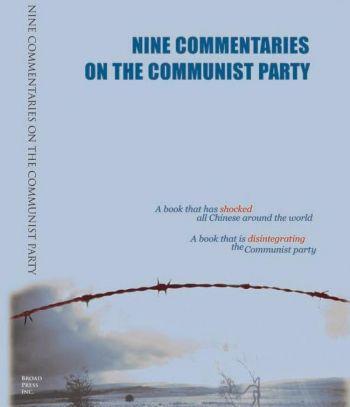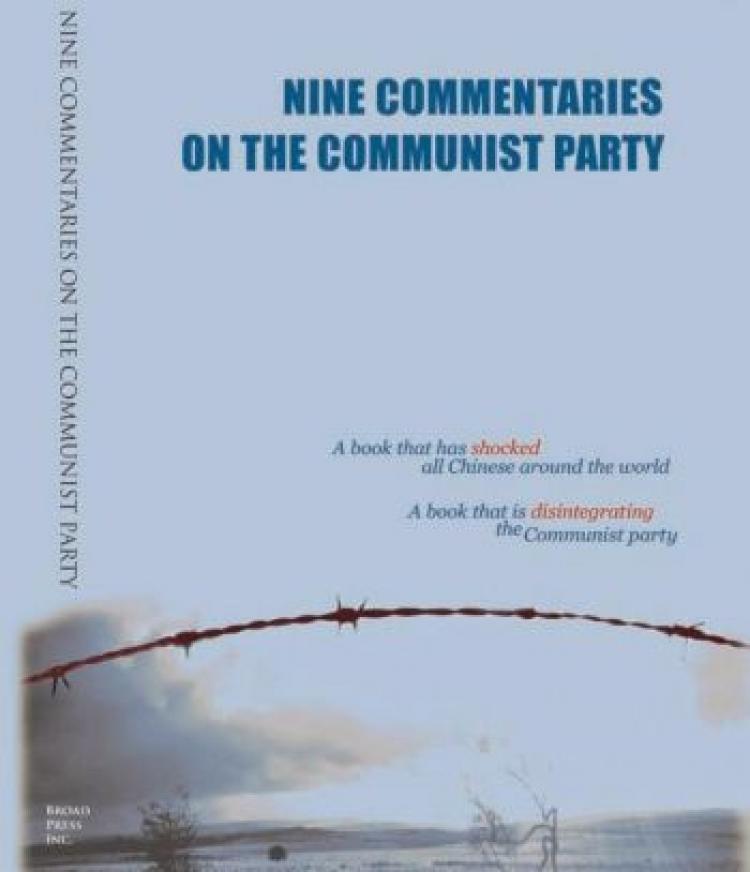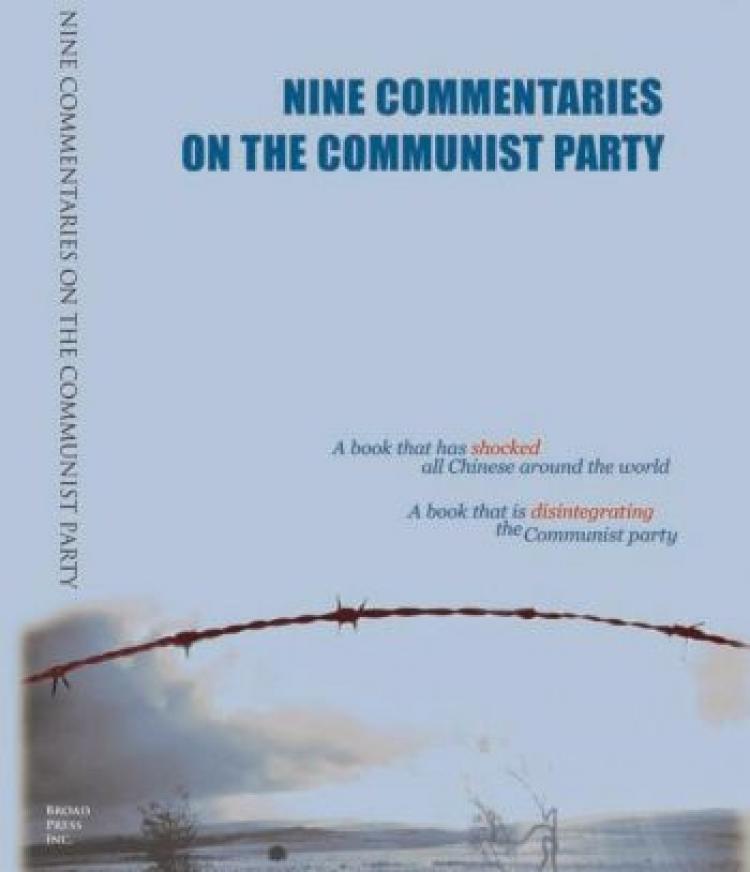It is widely known that the ruling powers in China do not tolerate dissent; the most well known example of this may be the 1989 Tiananmen Square Massacre.
What is less well known by the West are movements of popular dissent within China today, particularly those that have been spurred by the book, Nine Commentaries on the Communist Party.
Five years ago, in November 2004, the Nine Commentaries was published. The book is an exposition of the history of the CCP, its rise to power, and its rule for the past 60 years. The commentaries also discusses the ideology of the CCP within the context of Chinese culture and detail, in shocking fashion, the crimes committed by the CCP against the Chinese people.
These crimes are enormous. It is commonly stated that in it’s six decades of rule; the CCP has killed more people than Nazi Party in Germany and the Soviets in Russia combined.
The book has spread widely in Chinese communities, both inside and outside of Mainland China.
Although many books criticizing the Chinese regime have been published, none have had the overarching effect on Chinese people that the Commentaries have. Indeed many Chinese journalists and scholars say this book is having a transformative effect on Chinese society.
Mr. Wu Baozhang is a journalist who spent 27 years working at China’s state run Xinhua news agency. He has also recently served as a director in the Chinese department at Radio France International.
He told The Epoch Times, “For these past five years, I have kept the Nine Commentaries at my bed side and read it again and again. In its words, I vaguely see a blueprint of a democratic free China.”
Though the book does not specifically put forth suggestions for an alternate system to the current one, it asserts the current system is failing and is dragging the people down with it.
In the Commentaries, the authors write, “The CCP has been moving towards its complete doom. Sadly, it is still trying to tie its fate to the Chinese nation before its demise.”
The Commentaries describe that one of the most damaging results of the CCP’s rule came from the all pervasive propaganda, in the arts, media and education, which effectively established a “Party culture” for the Chinese people, forcing them to think within the Party’s own logic.
It says that the Chinese people, “need to help themselves; they need to reflect, and they need to shake off the CCP.”
Wu talked about evidence that ordinary Chinese are beginning to do that.
It has been widely reported by survivors of the 1989 Tiananmen Square student demonstrations, that the main current of students thought they were helping the Party to enact reforms—not actually demonstrating directly in opposition of the ruling party.
In today’s China, however, reporters are witnessing protesters shout slogans they would have never dared to even whisper before. Wu relayed stories from some French journalists who recently returned from China.
Wu said that at rallies in Shanghai and in Guangdong province, “people shouted, ‘down with the CCP!’ ... They sense that a significant change is brewing in Chinese society.” Wu credited the Nine Commentaries for “brewing” this change.
Speaking to the extent with which the Commentaries have spread throughout Chinese society, Shanghai human rights lawyer Zheng Enchong told The Epoch Times that even in the Party schools (schools specifically established to train new leaders in the CCP) students as well as faculty members are secretly reading the Nine Commentaries.
“When I was a Professor of literature in Heilongjiang, I had a female student who was a professor at a Party’s school in a provincial municipality and a professor in a University of Economics and Trade in Beijing. She said that the professors at this Party’s school have read the Nine Commentaries,” Zheng said.
Many high profile defectors from China in recent years have credited the Commentaries with prompting their decision to renounce the Party, including Jia Jia, an official from Shanxi Province, and Chen Yonglin, a former diplomat who walked out of a Chinese consulate in Australia.
“The CCP does not dare to openly discuss the facts mentioned in the Nine Commentaries, nor does it dare to rebut the Nine Commentaries… The CCP does not mention the Nine Commentaries in any of the educational materials used by the Party’s schools, pretending that it does not exist,” Zheng said, adding that “The CCP is very afraid.”
The Nine Commentaries have been the credited source of inspiration for several movements of dissent in today’s China. Undoubtedly, the Tuidang (or quit the Party) movement is the most prominent of these.
Tuidang, means to renounce the Communist Youth League, the Young Pioneers, and the Chinese Communist Party. At some point in their life, almost every Chinese citizen joins one of these three organizations.
According to the Tuidang website, it has received over 60 million statements from people making their withdrawals, at a current rate of around 50,000 statements per day.
Perhaps because it is impossible to verify the accuracy of these numbers, many people, including many “China experts” in the West, disregard them completely.
However, Zheng said that he believes the movement is pervasive.
“Although they have not publicly withdrawn from the CCP using either their real or pseudonymous names, in reality, I think the number of people in mainland who have quit the CCP and its affiliated organization far exceeds the number recorded overseas”
Zhen said that this is a reflection of the Commentaries ability to dissolve the “Party culture” that exists in people’s minds. “This Party culture can no longer establish a foothold among people. What the Party culture gives the general public is a corrupted culture.”
He described “Party culture” as a culture of violence and class struggle, and “There nothing good about this Party culture at all.”
Chinese legal expert, Yuan Hongbing, was formerly a professor at Peking University’s law school and has authored several books about life in China under totalitarian rule.
Speaking to why the Nine Commentaries have become a lightning rod for dissent, Yuan said that he thinks that the Nine Commentaries are the most easily understood and comprehensive of the many books that detail the tyranny of the CCP.
He also said that, “The wide and deep spread of the Nine Commentaries is inseparable from efforts of Falun Gong practitioners. For many years now, Falun Gong practitioners have gone to great lengths to promote the Nine Commentaries to fulfill their goal of awakening people. I think the promotion is perhaps as meaningful as the Nine Commentaries itself.”
That the Nine Commentaries contain information on the persecution of Falun Gong, a major crime which is actively covered up by the Chinese regime, could also explain their resonance.
As Yuan said, “The cruelty of this persecution is appalling. The CCP’s persecution against Falun Gong practitioners is the most severe human rights violation of our time.”
What is less well known by the West are movements of popular dissent within China today, particularly those that have been spurred by the book, Nine Commentaries on the Communist Party.
Five years ago, in November 2004, the Nine Commentaries was published. The book is an exposition of the history of the CCP, its rise to power, and its rule for the past 60 years. The commentaries also discusses the ideology of the CCP within the context of Chinese culture and detail, in shocking fashion, the crimes committed by the CCP against the Chinese people.
These crimes are enormous. It is commonly stated that in it’s six decades of rule; the CCP has killed more people than Nazi Party in Germany and the Soviets in Russia combined.
The book has spread widely in Chinese communities, both inside and outside of Mainland China.
Although many books criticizing the Chinese regime have been published, none have had the overarching effect on Chinese people that the Commentaries have. Indeed many Chinese journalists and scholars say this book is having a transformative effect on Chinese society.
Mr. Wu Baozhang is a journalist who spent 27 years working at China’s state run Xinhua news agency. He has also recently served as a director in the Chinese department at Radio France International.
He told The Epoch Times, “For these past five years, I have kept the Nine Commentaries at my bed side and read it again and again. In its words, I vaguely see a blueprint of a democratic free China.”
Though the book does not specifically put forth suggestions for an alternate system to the current one, it asserts the current system is failing and is dragging the people down with it.
In the Commentaries, the authors write, “The CCP has been moving towards its complete doom. Sadly, it is still trying to tie its fate to the Chinese nation before its demise.”
The Commentaries describe that one of the most damaging results of the CCP’s rule came from the all pervasive propaganda, in the arts, media and education, which effectively established a “Party culture” for the Chinese people, forcing them to think within the Party’s own logic.
It says that the Chinese people, “need to help themselves; they need to reflect, and they need to shake off the CCP.”
Wu talked about evidence that ordinary Chinese are beginning to do that.
It has been widely reported by survivors of the 1989 Tiananmen Square student demonstrations, that the main current of students thought they were helping the Party to enact reforms—not actually demonstrating directly in opposition of the ruling party.
In today’s China, however, reporters are witnessing protesters shout slogans they would have never dared to even whisper before. Wu relayed stories from some French journalists who recently returned from China.
Wu said that at rallies in Shanghai and in Guangdong province, “people shouted, ‘down with the CCP!’ ... They sense that a significant change is brewing in Chinese society.” Wu credited the Nine Commentaries for “brewing” this change.
Speaking to the extent with which the Commentaries have spread throughout Chinese society, Shanghai human rights lawyer Zheng Enchong told The Epoch Times that even in the Party schools (schools specifically established to train new leaders in the CCP) students as well as faculty members are secretly reading the Nine Commentaries.
“When I was a Professor of literature in Heilongjiang, I had a female student who was a professor at a Party’s school in a provincial municipality and a professor in a University of Economics and Trade in Beijing. She said that the professors at this Party’s school have read the Nine Commentaries,” Zheng said.
Many high profile defectors from China in recent years have credited the Commentaries with prompting their decision to renounce the Party, including Jia Jia, an official from Shanxi Province, and Chen Yonglin, a former diplomat who walked out of a Chinese consulate in Australia.
“The CCP does not dare to openly discuss the facts mentioned in the Nine Commentaries, nor does it dare to rebut the Nine Commentaries… The CCP does not mention the Nine Commentaries in any of the educational materials used by the Party’s schools, pretending that it does not exist,” Zheng said, adding that “The CCP is very afraid.”
The Nine Commentaries have been the credited source of inspiration for several movements of dissent in today’s China. Undoubtedly, the Tuidang (or quit the Party) movement is the most prominent of these.
Tuidang, means to renounce the Communist Youth League, the Young Pioneers, and the Chinese Communist Party. At some point in their life, almost every Chinese citizen joins one of these three organizations.
According to the Tuidang website, it has received over 60 million statements from people making their withdrawals, at a current rate of around 50,000 statements per day.
Perhaps because it is impossible to verify the accuracy of these numbers, many people, including many “China experts” in the West, disregard them completely.
However, Zheng said that he believes the movement is pervasive.
“Although they have not publicly withdrawn from the CCP using either their real or pseudonymous names, in reality, I think the number of people in mainland who have quit the CCP and its affiliated organization far exceeds the number recorded overseas”
Zhen said that this is a reflection of the Commentaries ability to dissolve the “Party culture” that exists in people’s minds. “This Party culture can no longer establish a foothold among people. What the Party culture gives the general public is a corrupted culture.”
He described “Party culture” as a culture of violence and class struggle, and “There nothing good about this Party culture at all.”
Chinese legal expert, Yuan Hongbing, was formerly a professor at Peking University’s law school and has authored several books about life in China under totalitarian rule.
Speaking to why the Nine Commentaries have become a lightning rod for dissent, Yuan said that he thinks that the Nine Commentaries are the most easily understood and comprehensive of the many books that detail the tyranny of the CCP.
He also said that, “The wide and deep spread of the Nine Commentaries is inseparable from efforts of Falun Gong practitioners. For many years now, Falun Gong practitioners have gone to great lengths to promote the Nine Commentaries to fulfill their goal of awakening people. I think the promotion is perhaps as meaningful as the Nine Commentaries itself.”
That the Nine Commentaries contain information on the persecution of Falun Gong, a major crime which is actively covered up by the Chinese regime, could also explain their resonance.
As Yuan said, “The cruelty of this persecution is appalling. The CCP’s persecution against Falun Gong practitioners is the most severe human rights violation of our time.”






